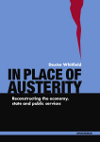This article originally appeared in Red Pepper in April 2012.
Dexter Whitfield argues that Compass’s alternative economic strategy, Plan B, is not enough
As 2011 wore on, the coalition’s economic failures accumulated in a growing pile of dismal statistics: the cuts were causing the economy to contract, debt to grow and creating a lasting damage to the social fabric. But what was there to challenge the coalition’s Tina (‘there is no alternative’) narrative? With the Labour Party failing decisively to set forth an economic programme that is either convincing or progressive, the need for civil society to deliver an alternative is clear and urgent.
The most significant effort to this end so far is Plan B: a good economy for a good society, launched by Compass in October. It contains proposals to kick start the economy with a modern industrial policy, create a fairer tax system, increase state-led investment via a British Investment Bank, reform financial regulations and advance a social investment state. Supported by over 100 economists, it was born out of a collaborative effort that must be sustained as a means of providing intellectual ammunition to the anti-cuts movement. While there is much to be welcomed, it is important to also analyse where Compass’s vision falls short, and where more work needs to be done.
One of the plan’s most significant problems is its failure to acknowledge the extent to which marketisation and privatisation is embedded into our public services. This blind spot leads it, in places, towards proposing policies that would further embed neoliberalism. A rethink is therefore required on this issue.
Marketisation strategies
First, we need to understand the different marketisation strategies that have been employed against the UK’s public services. First and foremost, financialisation (individual budgets, vouchers, payment by results, social investment bonds) and personalisation (so-called individual choice mechanisms and consumer participation) are means by which successive governments have transferred risk, cost and responsibility from the welfare state to individuals.
With the continued commercialisation of public services and sale of public assets, privatisation strategies have mutated. Once privatisation reached a threshold at which further sales of public assets were too complex or politically controversial, the emphasis shifted to the more subtle and insidious process of transferring services to arms-length companies and social enterprises, and creating new markets in privately financed services. The ‘big society’ agenda, the expansion of academy schools and the current NHS reforms are continuations of this wolf-in-sheep’s-clothing strategy. The already visible effects are that networks of publicly-owned schools and hospitals have been fragmented, so that each becomes a stand-alone business competing against its neighbours, leading to increased commercialisation and detachment from democratic control. Alongside this, there is the whole-service, public-private partnership model that combines PFI-funded capital investment with the delivery of entire services in 25-year contracts.
Taken together in a broad perspective, these policies are the means by which capital radically reduces the role of the state, while enhancing the position of business with new markets, tax breaks, subsidies, regulatory concessions and deepened involvement in policy-making. The consequences amount to the de-construction of democracy at local, national and international levels.
Well short
In this context, Plan B falls well short of the aim ‘to replace the political economy of market fundamentalism with a political economy for a good society’, because it does not acknowledge the character and scale of the problem in this vital area.
It refers to social justice, equality, sustainability and changing our attitude to ‘work, money and things’, but the lack of a framework of principles and values relating to public services means these ideas would not prevent a return to ‘business as usual’ and could be easily appropriated by the right and business interests to continue the process described above.
With Labour refusing to develop strategies to democratise public services, public-sector transformation has been rooted in competition and markets as the only means of reform. Plan B does not challenge this approach to transformation but proposes to ‘switch investment from symptoms to causes’ by promoting ‘a new state that spends better’. It conspicuously ignores the problems created by commissioning and outsourcing.
The need for alternatives here is particularly urgent as the coalition’s ‘commissioning council’ model, which outsources or transfers virtually everything done by local government in terms of service delivery, leaving a small ‘strategic’ hub, is gaining momentum – for example, in Barnet, Cornwall, Essex and Solihull. While this development has received little attention, its consequences for democracy could be just as profound as any of the coalition’s other policies.
Instead, the Plan B report promotes the concept of ‘co‑production’, in which service users and front-line staff work in partnership to ‘permanently control costs and increase productivity while making services more responsive and democratic’.
There would be the basis for wide agreement on this if co‑production simply meant service users and staff collaborating in service design and delivery. However, the problem is that ordinary citizens as service users cannot ‘co-produce’ because they do not have an economic role in the production of services in the sense of control over finances, employment and management. Participation alone does not give users the power to effect change.
Social enterprises
The next problem with the Plan B strategy on public services is its argument that co-operatives and social enterprises can increase efficiency by improving motivation at work, promoting entrepreneurship and wider asset ownership. Transferring privately-owned businesses to the non-profit sector and collective ownership is a progressive move, but transferring public services to social enterprises is definitely not.
Social enterprises are being used to shrink the public sector, and history shows they become a pathway to full privatisation. The growth of leisure trusts, for example, arose not from entrepreneurship but from tax avoidance as local authorities sought budget savings. The employee-owned bus companies created in the wake of bus deregulation in 1985 were subjected to ‘bus wars’ and acquired by the major bus companies. Social enterprises spawned from the public sector today may well lead to similarly disastrous results, and will at least further embed the commissioning culture.
We need an alternative strategy that is more comprehensive and radical, rooted in a framework of socialist principles and values, and designed to reconstruct the economy, the state and public services. The state must have the resources and ability to fund, plan, provide and regulate its core functions: democratic and civil society; national and international responsibilities; human needs and development; economic and fiscal management; and the regulation of markets, firms and organisations.
Voluntary and private organisations and social enterprises have an important but limited role. International, national and local taxation should be the prime revenue source to fund public services and the welfare state. The user-pays taxation model that the coalition is moving towards will prove much more expensive than public provision through general taxation. It is inequitable, regressive and significantly reduces collective provision – in the long run it will lead to the demise of public services and the welfare state.
Plan B’s search for a system of measurement that goes beyond gross domestic product (GDP) and simplistic ‘happiness’ indices is important. Equally, though, there is an urgent need for current projects and policies to be more rigorously assessed for economic, social justice, health, sustainability and environmental impacts.
The means of production and service delivery are fundamental to the quality of work and life; hence the quality of inputs, processes and outputs are equally important as outcomes. In‑house provision is essential.
Marketisation should be dismantled and commissioning abolished to provide new opportunities to redesign service delivery. A new public service management with democratic and participative governance, public planning and investment must have a pivotal role in the reconstruction strategy. Alternative plans must be rooted in organising and action strategies, otherwise they have limited traction.




